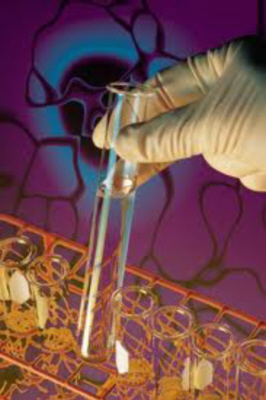Parkinson's Disease News covers
all significant new research, reports, books, and resources concerning
Parkinson's Disease.
Articles are chosen on the basis
of their medical significance or potential interest. Our overwhelming priority
is the facts, regardless of whether they contradict prevailing views or vested
interests. Analysis and further information are provided
either to explain the background or implications, or to
balance misleading claims. If you notice errors or inadequacies, or dispute what is
written, or want to propose articles, please
e-mail
[email protected].
 ��� �
��� �
 �����
�����
 �� ��
�� ��
 ����
����
 ��� �
��� �
 ����
����
 ����
����
 ����
����

�
12th November 2016 - New research
PEPTOIDS AS A BIOMARKER FOR PARKINSON'S DISEASE
|
�CLICK HERE
FOR A
PRINTABLE OR WHITE BACKGROUND VERSION OF THIS ARTICLE |
 Costly
methods of diagnosis� such as the SPECT scan or the PET scan are used
for the indication of Parkinson's Disease. However, in early Parkinson's
Disease a far less costly
and relatively non-invasive biomarker would be preferable. Researchers� identified a peptoid called PD2,
which binds significantly higher levels of IgG3 antibody in those people with Parkinson's Disease.
The PD2 peptoid was found to be� 68% accurate in identifying Parkinson's Disease,
which is less accurate than existing methods. However, PD2
was 84% accurate in identifying new cases of Parkinson's Disease. It
is new cases of Parkinson's Disease that existing methods are not so
accurate with. PD2
levels are also positively correlated with the United Parkinson's Disease Rating
Scale score, which is the primary symptom questionnaire for Parkinson's
Disease. So the researchers concluded that PD2 may be useful for the
diagnosis of early Parkinson's Disease.
Costly
methods of diagnosis� such as the SPECT scan or the PET scan are used
for the indication of Parkinson's Disease. However, in early Parkinson's
Disease a far less costly
and relatively non-invasive biomarker would be preferable. Researchers� identified a peptoid called PD2,
which binds significantly higher levels of IgG3 antibody in those people with Parkinson's Disease.
The PD2 peptoid was found to be� 68% accurate in identifying Parkinson's Disease,
which is less accurate than existing methods. However, PD2
was 84% accurate in identifying new cases of Parkinson's Disease. It
is new cases of Parkinson's Disease that existing methods are not so
accurate with. PD2
levels are also positively correlated with the United Parkinson's Disease Rating
Scale score, which is the primary symptom questionnaire for Parkinson's
Disease. So the researchers concluded that PD2 may be useful for the
diagnosis of early Parkinson's Disease.
Reference : NPJ Parkinsons Disease [2016] 16012 Epub Jun 23 (U.Yazdani,
S.Zaman, L.S.Hynan, L.S.Brown, R.B.Dewey, D.Karp, D.C.German)
Complete abstract��For more news go to
Parkinson's Disease News
�
 E-MAIL NOTIFICATION : If you would like to be
notified by e-mail when any new articles are added to Parkinson's Disease News,� please merely
e-mail
[email protected] with the message
"subscribe".� No form of identity is required.� E-mail addresses are
not used for any other purpose.
E-MAIL NOTIFICATION : If you would like to be
notified by e-mail when any new articles are added to Parkinson's Disease News,� please merely
e-mail
[email protected] with the message
"subscribe".� No form of identity is required.� E-mail addresses are
not used for any other purpose.
.gif)
.gif)
 ��� �
��� �
 �����
�����
 �� ��
�� ��
 ����
����
 ��� �
��� �
 ����
����
 ����
����
 ����
����

 Costly
methods of diagnosis� such as the SPECT scan or the PET scan are used
for the indication of Parkinson's Disease. However, in early Parkinson's
Disease a far less costly
and relatively non-invasive biomarker would be preferable. Researchers� identified a peptoid called PD2,
which binds significantly higher levels of IgG3 antibody in those people with Parkinson's Disease.
The PD2 peptoid was found to be� 68% accurate in identifying Parkinson's Disease,
which is less accurate than existing methods. However, PD2
was 84% accurate in identifying new cases of Parkinson's Disease. It
is new cases of Parkinson's Disease that existing methods are not so
accurate with. PD2
levels are also positively correlated with the United Parkinson's Disease Rating
Scale score, which is the primary symptom questionnaire for Parkinson's
Disease. So the researchers concluded that PD2 may be useful for the
diagnosis of early Parkinson's Disease.
Costly
methods of diagnosis� such as the SPECT scan or the PET scan are used
for the indication of Parkinson's Disease. However, in early Parkinson's
Disease a far less costly
and relatively non-invasive biomarker would be preferable. Researchers� identified a peptoid called PD2,
which binds significantly higher levels of IgG3 antibody in those people with Parkinson's Disease.
The PD2 peptoid was found to be� 68% accurate in identifying Parkinson's Disease,
which is less accurate than existing methods. However, PD2
was 84% accurate in identifying new cases of Parkinson's Disease. It
is new cases of Parkinson's Disease that existing methods are not so
accurate with. PD2
levels are also positively correlated with the United Parkinson's Disease Rating
Scale score, which is the primary symptom questionnaire for Parkinson's
Disease. So the researchers concluded that PD2 may be useful for the
diagnosis of early Parkinson's Disease.  E-MAIL NOTIFICATION : If you would like to be
notified by e-mail when any new articles are added to Parkinson's Disease News,� please merely
e-mail
E-MAIL NOTIFICATION : If you would like to be
notified by e-mail when any new articles are added to Parkinson's Disease News,� please merely
e-mail
